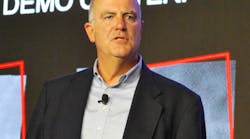Process manufacturing organizations are under pressure to attract and retain a workforce that will see us through the current wave of retiring Baby Boomers. Further, they need to ensure that workforce is adequately prepared to deal with an ever-changing blend of technology that combines an increasing share of IT tools in addition to a legacy base of purpose-built operational technology (OT).
A group of delegates to this week’s 2023 Honeywell Users Group in Orlando, Fla., gathered to share what is working for them—and, frankly, what’s not—in an open discussion session entitled “Is Your Workforce Future-ready?” David Bell, DuPont control systems manager and vice chair of this year’s HUG event was joined by Manas Dutta, group manager, Honeywell Workforce Excellence, to lead the wide-ranging conversation.
“We’ve had lots of retirements, and COVID really accelerated that,” began Bell, acknowledging that all organizations are also looking to be more productive without adding staff. Meanwhile, jobs are evolving continuously, often with increased scope of responsibility. “We need to attract and retain top talent, and traditional learning methods are often ineffective for a new generation of workforce,” he said.
IT skills essential to OT workforce
One central discussion topic of the 45-minute session was the ongoing struggle to complement the engineering capabilities of the control system team with necessary IT skills—whether in the same or complementary personnel. “It’s amazing how much of the control system engineer’s job has moved from optimizing process performance to managing patches and configuring networks,” said one attendee.
Some discussion participants have found success by recruiting younger workers with IT skills into the organization. “I’ve found that we’re on a Microsoft schedule now,” said one veteran controls engineer. “We hired some young IT talent, and they were a godsend from a systems perspective,” he said. For some, embedding IT professionals in the OT group has allowed process controls engineers to focus on higher value work. And another participant noted that younger field operators don’t expect to shadow an experienced operator to learn the ropes but would rather have on-demand video and other interactive instructional materials at their disposal.
While building a mixed IT/OT skills base that complements control functions is clearly a priority, some cultural transitions are still needed—such as the tendency of IT folks to expect four hours to respond to a ticket, said one attendee. Another noted that he had found direct communications on the different priorities of an OT environment and concomitant expectations effective in managing those accustomed to typical IT response mechanisms.
When it comes to training console operators, the effective use of operator training simulators (OTS) got a somewhat mixed review from session attendees. By show of hands, only a few of the attending organizations actively used them, and for many others the time and effort required to keep them in sync with current control system configuration outweighed the potential benefits. “They’re always out of date,” remarked one session participant, while another countered that if it’s used to train operators in a dozen key scenarios even a somewhat outdated OTS configuration could be better than no training simulator at all.
One IT-trained session participant noted that she shadowed an electrical engineer for two years after joining her company and is now lead for the organization’s OT cybersecurity efforts. She commented that we’re not doing enough in the university system. “They can’t learn it all on the job,” she said. “And the chemical engineers who are often in management roles need to understand how IP addresses are generated and maybe what is a subnet,” she added.



